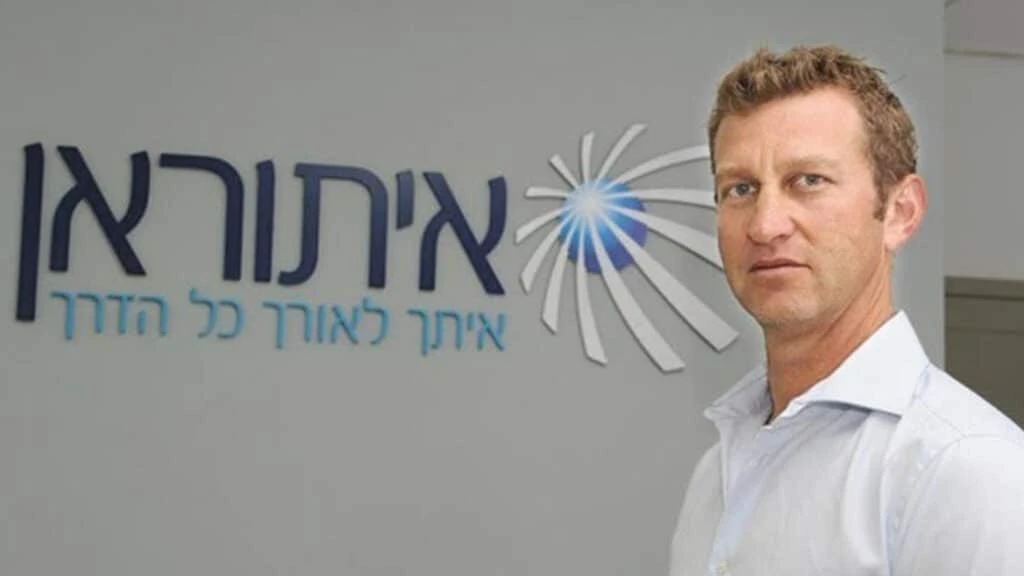"The higher the crime rate, the higher the demand for our services": an interview with the head of Ituran

"There is no doubt: the higher the level of crime and violence, the higher the demand for our services," says Eyal Sheratzky, co-executive director of Ituran. He gave an exclusive interview for Oninvest.
This Israeli company, whose capitalization on Nasdaq is almost $580 million, provides satellite-based vehicle monitoring services. It helps customers to search for stolen cars, insurance companies to track customers' driving habits, and cars themselves to communicate with each other by transmitting information about the direction of travel, speed, warning of sudden braking, and so on.
"I don't think crime is going to disappear anytime soon, there is more and more instability in the world," says Sheratsky, sitting in the company's headquarters in Azura, a small town near Tel Aviv.
During the interview, a missile danger siren sounds, forcing him to go for cover.
A little dream
Ituran is very much a family company. It was started by Izzy Sheratsky and his two sons, the oldest Eyal and the middle Nir. They were later joined by Izzy's youngest son Gil, as well as Izzy's brother Efraim and niece Tal Sheratsky-Yaffa. Thus, two generations of the Sheratsky family are involved in the business.

Ituran's business began in 1995. Izzy Sheratzky had already been working in the insurance industry for 20 years and was investigating insurance company claims, recalls Eyal Sheratzky.
So he knew firsthand about the problem of car theft in Israel and started looking for a solution in this area. It came from the engineering company Tadiran - a radio-frequency-based tracking system to detect stolen cars. It was bought by a group of investors led by Izzy Sheratzky "for a few million dollars," Eyal says.
Tadiran originally developed the solution for the Israel Defense Forces, then converted it for civilian use as well, but did not succeed with commercial sales.
And the system itself had significant limitations, Sheracki recalls: the GPS satellite navigation system was used mainly by the military, and its civilian use was limited, as was the penetration of cellular communications. So radio frequencies were used to operate the new technology.
Initially, Ituran expected that its clients would include insurance companies. But they soon realized that simply having the technology was not enough - the insurers needed to be shown concrete cases of successful application of the technology.
So Ituran began, for a monthly subscription, to allow motorists to use the company's service. As a result, it was able to demonstrate the result the insurers wanted and the payers could save money.
The first years of Ituran's development were limited by radio frequency bandwidth.
"Back then, we had a dream: to get up to 300,000 drivers as subscribers. But everyone thought we were crazy - the Israeli market was so small," says Eyal Sheratsky. - It's funny to think about it now.
Everything changed with the advent of GSM and then GPRS technologies, which allowed data exchange not only within the GSM network, but also with external networks. This is how Ituran began to provide satellite transportation monitoring services.
The system is based on a black box with sensors that is installed in the car and a program that transmits data to a server. This can be data about where the car is now, whether the driver is speeding, whether there are any faults in the car, and so on.
The company now has 2.3 million subscribers in 26 countries. "This is much more than we expected," says Eyal Sheratzky.
From local to global
With the expansion of network capacity, Ituran thought about other solutions that could become drivers of its development, recalls Eyal Sherazki.
This is how a fleet management solution and a product for insurance companies called Usage Base Insurance (UBI) came into being. This is a type of car insurance that calculates the insurance premium not only on the driver's experience and age, but also on the kilometers driven, the style of cornering and whether the airbags have been deployed in the car, i.e. whether the car has been in an accident.
Sheratsky divides the company's customers into two types: consumers who use Ituran solutions for their own needs, and fleets, insurance companies, car dealers and car manufacturers. Customers and products may differ from country to country, depending on their mentality. Therefore, Ituran always starts developing for local needs and then tries to promote it in other markets, says Sherazki.
He gives this example: in Brazil, motorcycles are a very popular form of transportation, but for a long time insurance for them was so expensive that people refused to buy it.
"We developed a special unit that can be built inside a motorcycle and that knows how to send signals to its owner and to our control center. This has reduced the risks for insurance companies," he says.
So here Ituran acts as a broker for insurance companies to bring in clients.
In the US and Israel, motorcyclists use the Ituran solution for the exact opposite reason. They don't want to insure their vehicles.
"So I don't think we're competing with insurance companies," Eyal Sheratsky reasoned. - We are getting an audience that would never have been an insurance client, we are opening up a huge and empty market for ourselves without cannibalizing it".
In 2023, Ituran signed its first contract with a bank for itself, agreeing with Santander's subsidiary in Brazil. The bank's customers, having installed a tracker from the Israeli company, could get faster approval for a car loan at a more favorable rate.
Sheracki calls the project beneficial for both parties: "We have saved them tens of millions of reais, due to the fact that the bank provides coverage for its collateral. For us, the profitability has also been very good, so we are doing everything we can to extend the contract."
Sherazki said that so far the Santander subsidiary has exclusive terms, meaning Ituran cannot enter into a similar agreement with another bank anywhere else. This agreement expires in February 2025, the company has already started negotiations with another player (Sherazki did not name him) and does not plan to stop there.
Add value
The demand for Ituran's services is mainly related to the recovery of stolen cars. But whereas 10 years ago it was 95 percent of the company's business with solutions for recovering stolen cars, now it's two-thirds, says Sieracki.
In recent years, the company has been developing value-added services. These include, for example, a concierge service that can help you get to the nearest gas station or hospital, or help you on the road, for example, in case of a car malfunction. Another example is the "connected car" platform, which includes, among other things, information about the car's service history, the operation of its systems and malfunctions, provides remote communication with the car and even allows you to make an appointment for service.
Ituran has partnered with automakers Nissan and General Motors. But, Sheratsky notes, the company is interested in receiving regular fees, so it prefers to provide its services on the automakers' technology platform.
A year ago, the IturanMob division agreed a partnership with the Porsche Cup Brazil racing championship to provide the Porsche engineering team with real-time information on the car's performance and endurance metrics - engine management and tire management.
Two exchanges
Sheratsky calls Ituran's approach to doing business conservative: minimum credit, maximum cost control. At one time, the company used debt, but since the early 2000s, it has almost completely abandoned it, Sheratsky says. At that time, the dot-com bubble burst and a huge number of Internet startups went bankrupt. Investment funds lost about $5 trillion at the time.
Ituran relied on public offerings. In 1998, it held an IPO on the Tel Aviv Stock Exchange and raised $6 million at a company valuation of $30 million. The issue was a success, recalled the Israeli edition of Globes. The company's initial valuation in preparation for the IPO was 142 million shekels, but in the end the offering was based on a valuation of 162 million shekels. Ituran invested the proceeds in expanding its business in Brazil and Argentina and entering the U.S. market.
Seven years later, in 2005, Ituran went public on the Nasdaq.
"Our shareholders wanted more liquidity, and we wanted to expand our shareholder base and access new investments," says Sheracki.
In New York, Ituran has already raised $49.9 million at a $294 million valuation, with $12.5 million worth of securities sold by its shareholders.
Sheratsky adds: Ituran has paid out about $400 million in dividends over 19 years, which, incidentally, is why the Forbes author included it in his list of five unloved small-cap companies. If a company pays dividends, it has nowhere to reinvest those funds, which means its growth opportunities are limited, the Forbes author explained his choice. Sheratsky has a different logic: "Ituran is growing, its customer base is increasing, the company has no debt and is sharing money with shareholders - that's the best thing possible.
Simply Wall St analysts ranked Ituran among three dividend stocks for investors looking for stability. Freedom Broker lists Ituran as one of six companies with great growth potential. Ituran is followed by two analysts, according to MarketWatch, and their recommendation is buy, with a target price of $36.1 per share. On Monday, November 25, trading in its securities on the Nasdaq closed at $29.14.
In the past three years, Ituran has been growing at the fastest rate in its history, says Sheracki. In 2023, its revenue is up 9% to $320 million and net income is $48.1 million (plus 30% year-over-year); in 2022, revenue and net income are up 8% to $293.1 million and $37.1 million, respectively. In 2021, revenue amounted to $270.9 mln (plus 10% year-on-year) and net income amounted to $34.3 mln.
Sheratsky says the company has had two of the most difficult periods in its history - the 2008 financial crisis and the coronavirus pandemic - but its conservative approach helped here, too. In 2008, for example, the company had $25 million in net cash on hand with no debt, so it barely felt the collapse of the banking system, he says.
In the midst of the quarantine pandemic, new car sales plummeted, and with them the demand for Ituran devices. At the same time, car owners did not sell their cars and continued to pay for subscriptions to Ituran solutions. In 2020, the company's revenue fell 12% year-over-year to $245.6 million, with net income of $16.1 million.
Ituran now has a new goal of having more than 3 million subscribers in five years and a portfolio of "diverse services and cutting-edge solutions," says Sieracki. She plans to achieve this by entering new segments and regions and selling new technologies, such as big data systems.
This article was AI-translated and verified by a human editor
